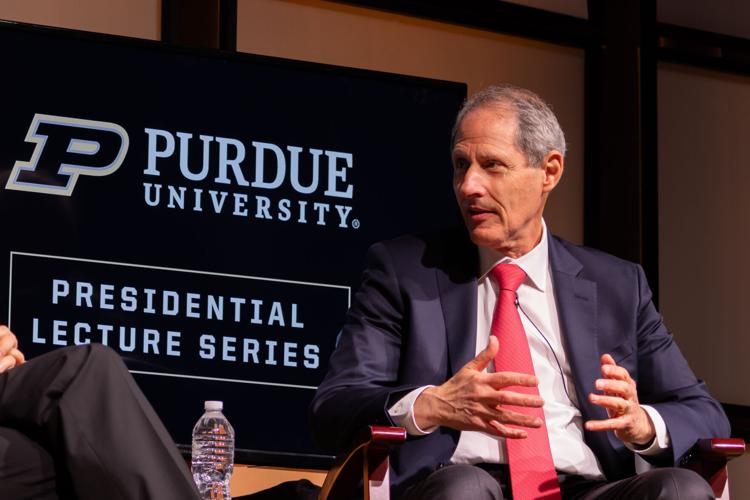Caltech President Thomas Rosenbaum sat down with Purdue President Mung Chiang Thursday to talk about quantum mechanics, in the most recent edition to the university’s Presidential Lecture Series, titled “A Second Quantum Revolution: Harnessing Quantum Technology for the Future.”
Rosenbaum spoke his inspirations which led him to pursue the sciences.
“I was 14 when they landed on the moon, and it was incredibly exciting,” he said. “It also led to national endorsement of the importance of science — that’s something we’ve lost these days.”

During the final Presidential Lecture of the semester, Caltech President Thomas Rosenbaum talks about the promising research in the field of quantum physics and how this research will affect other industries.
The two presidents also spoke about the differences and similarities between theoretical sciences and applications of science. While Rosenbaum’s career has dealt with more theoretical sciences, like quantum mechanics, he also has been involved in multiple engineering endeavors.
One such being the founding of the University of Chicago’s first engineering school, in which Rosenbaum had a large part in its creation.
He also praised Purdue’s engineering programs for producing great graduates.
“The Midwest has a little bit of the flyover mentality. People think of the coasts (for engineering schools), yet, if you look at engineering in the Big Ten and through the Midwest, it’s the powerhouse in the country,” Rosenbaum said.
The presidents also mentioned the importance of universities in society as a means for innovation and development.
“Just look at big pharma, they don’t create new drugs, they fund universities (to create them),” Rosenbaum said.

Caltech President Thomas Rosenbaum laughs as Purdue President Mung Chiang asks him about Sheldon Cooper from the popular TV show “Big Bang Theory,” which was set at Caltech.
The Caltech president mentioned specific quantum research being conducted at Caltech and universities around the country: research about simulated annealing, a complex quantum problem of trying to determine the shortest path out of many options.
“(Imagine) you’re coming down a mountain and you want to get to the base of the mountain, but there’s a cave you get stuck in,” he said. (The problem is), how do you get out of the cave and not report incorrectly that you were at the bottom?”
Previous solutions would allow the program to rise in elevation to get out of the cave, even though rising would mean being farther away from the bottom of the mountain.
“Now (with quantum annealing), we are looking at what if you could tunnel out of the cave instead.”
While these complicated quantum problems may be niche, Rosenbaum said he still believes they are important.
“If there’s a commercial product that comes out (of this research into quantum mechanics), then great,” he said. “But fundamentally, you’re going to learn about how the universe works.”





